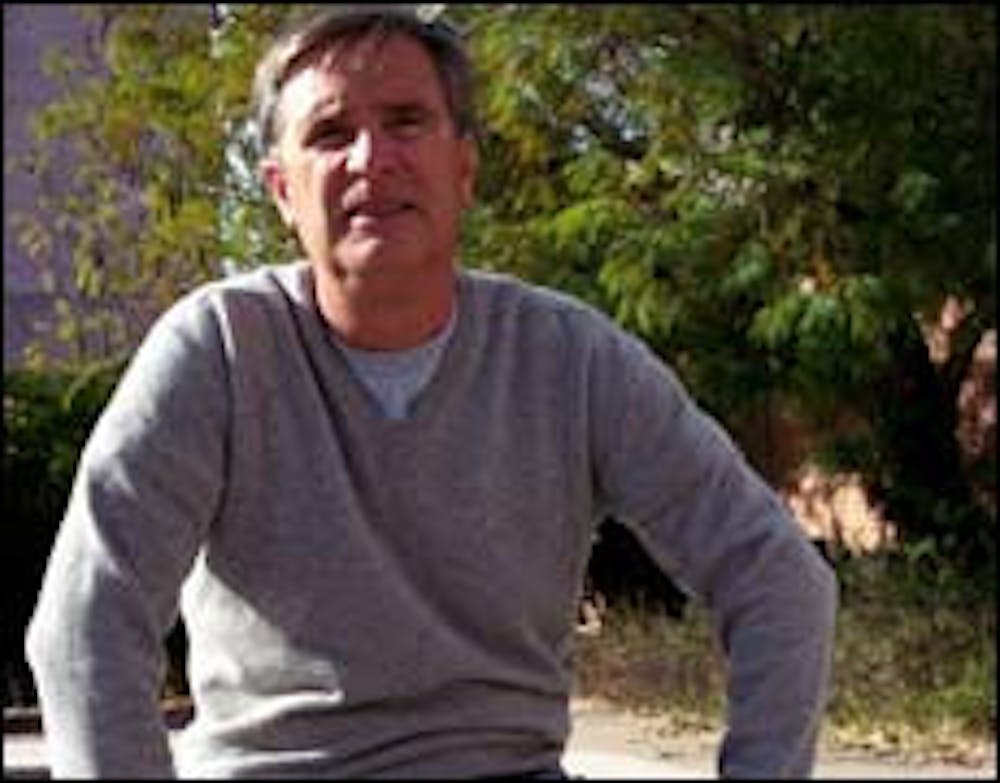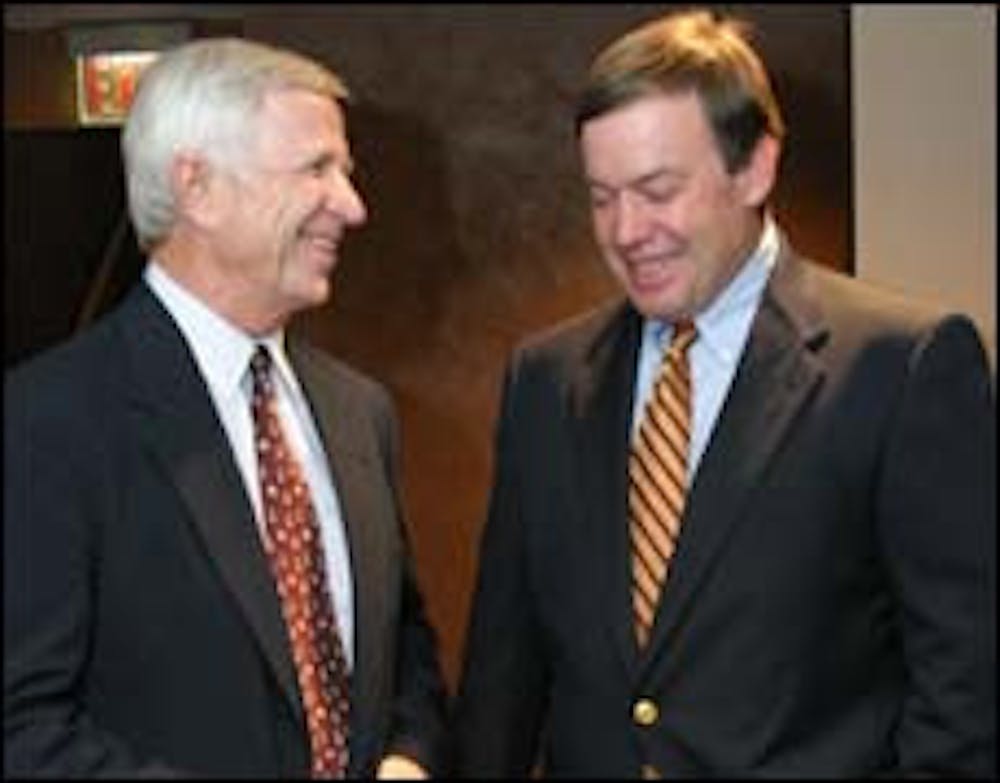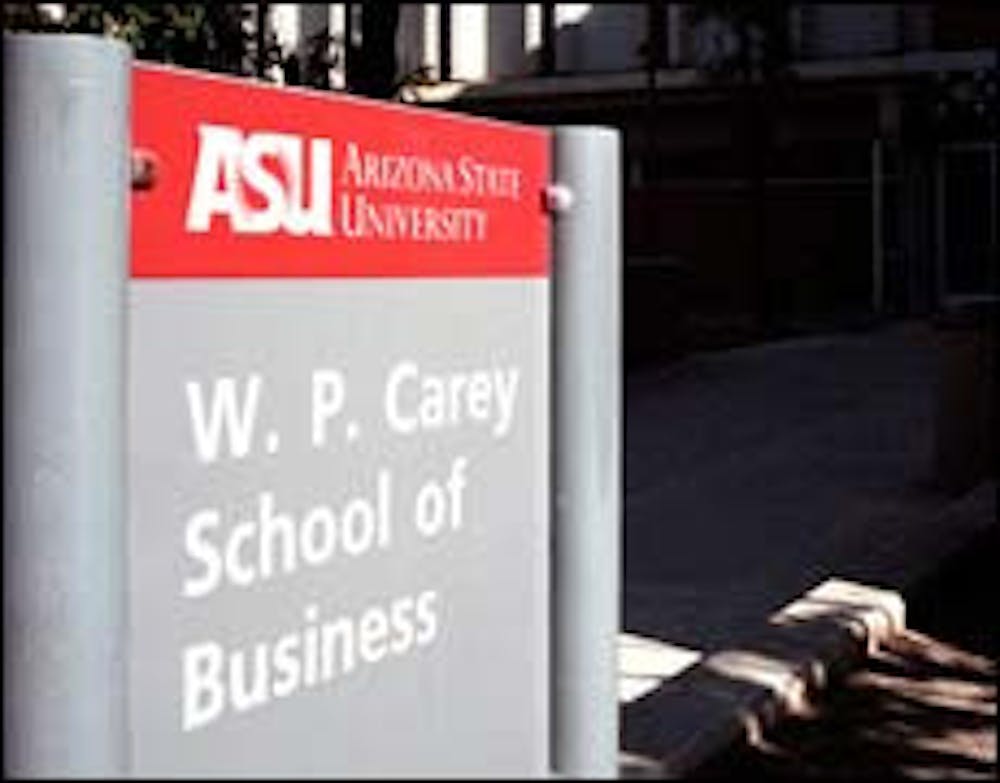Though universities are traditionally hotbeds of activism, usually of the liberal sort, the collective personality of ASU seems averse to politics. Based on a random sample of 256 faculty members, approximately 80 percent are registered to vote (of those, approximately 51 percent are Democrats, 23 percent are Republican, 23 percent are independent or didn't choose a party, 1 percent are Greens and another 1 percent are Libertarians), and about 80 percent of those who registered actually did vote in at least two of the last three general elections.
Interestingly, administrators are generally more active than faculty, with 23 of 28 administrators surveyed registered to vote, and six of them political donors. Political science professors don't vote as much as you would expect, with 16 of 21 registered to vote and only two listed as donors.
So why are ASU faculty members less than enthusiastic in their politics?
One man's idea
President Crow's radical vision of ASU's future may have something to do with that.
"My vision for Arizona State University is to pioneer a new model for the American research university, one that breaks the mold I believe has constrained these institutions for decades, if not for centuries," he wrote in a letter at the beginning of a fall 2003 special edition of ASU Vision, the magazine of ASU's Alumni Association.
To call his ideas ambitious would be an understatement.
But since President Crow arrived here in 2002, he has pursued that vision aggressively. He wooed donors like William Polk Carey ($50 million to the former College of Business), Ira A. Fulton ($50 million to the former College of Engineering & Applied Sciences and $5 million to the College of Education) and the Virginia G. Piper Charitable Trust ($10 million to establish a creative writing center). "We've dramatically increased our requests to private citizens for donations," he says.
Crow has also worked with the legislature to get funding necessary to make the American reach university a reality. Already, through the research infrastructure bill that passed the legislature and was signed by Gov. Janet Napolitano in October, Crow has secured about $185 million to build the facilities that would make government and corporate investment to ASU more common. Nevertheless, one of Crow's goals is to reduce from 35 percent to 10-20 percent the proportion of ASU's budget that comes from the state. But he hopes to increase the physical size of the campus, the number of private donations, tuition and other finances, so much that even though the percentage of funds from the government would be lower, the actual dollars would be higher.
And to make this possible, he will need as much influence as possible with Arizona's lawmakers.
Avoiding a political machine?
So what is the man doing to influence our lawmakers in his favor?
"President Crow has contact with each member of the legislature during the year to try to explain where we're going," says ASU's Executive Vice President and Provost Milton Glick. "I think what's important is the approach President Crow is taking: That the state is our single largest investor and the value proposition that he's putting before the state is that 'if you pay for (ASU's) core functions, we will deliver a higher quality of life in the state.'" Glick says that will be accomplished partly by increasing graduation rates and creating a state technology research base. "One of the things President Crow has been very vocal about is that if the state will fund the basic core needs of the university, then we will leverage those funds to move the University beyond that," through research funding, grants, private gifts and "technology transfer," he adds.
But Crow eschews traditional lobbying methods, saying they're "not a successful strategy," and they "avoid the merits of the case," turning a university into a political operation.
"We're not engaged in any of the political activities, we're not engaged in any of the fighting," he says of the appropriations process that can sometimes turn nasty when competing schools are desperate for funds from a cash-strapped state.
"We don't get involved in the politics side. We get involved in the policy side. I take what I call a rational case approach. We'll make the case and you all who are duly elected by your district, you will look at it and decide if it's the kind of investment that you want to make," Crow says. "It may be that we're naïve in our approach or simplistic in our approach, but that's our approach."
Naïve, simplistic or otherwise, it's been effective. "(Crow) was a good persuader," says Sen. Harry Mitchell, D-Tempe, whose district includes the ASU campus. "He was successful in getting some funding in a year when we had a real budget crisis. No one thought it was possible."
Dissatisfaction with a vision
Despite Crow's successes, not everyone at ASU is enamored of his robust changes. Some have expressed discontent with his emphasis on planetary, life and material sciences, where the research grant money flows most freely. There has been some grumbling about the low faculty and staff salaries and jealousy of those select few who received large salary increases in an effort to avoid attrition of teaching talent. A Universitywide raise effective Jan. 1, 2004, was recently announced for faculty and staff "who perform at high levels," but many who consider themselves worthy will undoubtedly complain about being passed over.
The tuition increases have also raised eyebrows because of an Arizona constitutional clause that requires university tuition to be "as nearly free as possible," and there has also been talk (as unique as Crow's strategy and plans for ASU) that his nonpolitical approach leads to a loss of potential influence in the legislature, and that a lack of encouragement acts as a damper on individual political activity among the faculty and administrators.
"There are two ways to influence the legislature - alumni associations and having faculty as members of the legislature," says ASU psychology in education professor Jay Blanchard, who, as a Democrat, defeated Arizona's Republican Speaker of the House Jeff Groscost in 2000 to win a state senate seat. "NAU and UA have historically had a faculty member in the legislature," Blanchard says, mentioning John Wettah, Andy Nichols and George Cunningham.
Blanchard says ASU counts on its size and the size of its alumni association to guarantee the political clout needed to promote a legislative agenda.
"I think this puts us at a disadvantage compared to NAU and UA," he says. "Having members in the legislature is a more direct route than calling on the alumni association to defend the interests of the university. It's like we're one step away from the actual (legislative) process."
The fight over faculty politicians
Blanchard says he thinks ASU's administration is less than encouraging to faculty or administrators who may want to run for office. "One reason they don't run is that the University does not support (them). In my case they reduced my salary by the amount I earned in the legislature," which he says is not necessarily the practice at other universities. In fact, he says, NAU and UA have worked with faculty to make sure that it's not financially detrimental for them to serve in the legislature. "I think the University should encourage faculty who are interested to run for office and should be supportive of their efforts," he says.
Vice President Glick says that while ASU sees alumni as important advocates for the University, "We have never believed that having faculty in the legislature representing ASU was appropriate. We think that if they wish to do that then we support that." But he adds, "not as a university." He agrees that ASU faculty performing "a positive civic duty" in the legislature "will probably be supportive," but "we don't see them while they're there as advocates of ASU."
But Blanchard says they are de facto advocates for the university. "Faculty members in the legislature, like it or not, end up representing the university. You're constantly called upon to defend the policies and practices of the university. Whenever anything would happen at ASU, other legislators would ask me what was going on." For example, he says, he first heard about ASU professor Christian Faltis' conviction for assault while on the senate floor. "I think we (ASU) would gain enormous political clout by having a faculty member or administrator in the legislature," he says.
Sen. Mitchell says a faculty member in the legislature can be an advantage for any university. "When you have someone in the caucuses all the time, they can judge the direction of feeling the legislators have and give a heads-up to the university. You might say it's intelligence gathering." Mitchell says that when he served in the senate with John Wettah, who was also an NAU chemistry professor, "everybody in the legislature knew he was looking out for NAU's interests, and that he was going to be very vocal about it. Everybody expected him to speak out on NAU issues, and he did."
The effects on ASU
Mitchell also says ASU often gets the short end of the stick in the legislature, which is part of the reason Crow wants to be more independent of state funding. "(ASU has) higher and faster enrollment growth," he says. "It's an historic problem that ASU has had, and I don't think the legislature takes that into consideration. When there's a legislator who's a colleague from a university, I think they've probably got to have a little more influence because (other legislators) see them every day."
Mitchell also says having an ASU faculty member on the appropriations committees where they could "constantly beat the drum" would be especially advantageous. "That's what everybody else does," he says.
Blanchard, who served on the senate appropriations committee while in office, agrees. "It's important that someone inside those negotiations represent ASU," he says.
President Crow, specifically mentioning Blanchard, reaffirms his nonpolitical approach to running ASU. "Those guys on their own time they can run off and do whatever they want. That's not the approach the University takes. I just think the University needs to make its case, and if we become political then we become just another political force out there," he says. "I think our base state is in a sense not political. Hopefully people will be able to make that investment (that ASU requests of the legislature) and if so, then we will move forward. We don't need to be involved in the actual electoral politics to do that."
It would take more exhaustive research or a change in administration to find out if ASU faculty members would be more politically active under an encouraging administration; but under this one that prefers to keep its hands clean of political taint, they're generally lackluster activists at best.
"I think at ASU the administration has viewed faculty that are particularly active... (Pause)... the administrations are not particularly supportive of faculty or administrators being politically active," Blanchard says.
"I would say there are a number of them that are very engaged (politically), and then a large number that are not engaged," Glick says about ASU faculty.
"I don't see them politically active at all," Harry Mitchell says of the same group (adding that he can't speak authoritatively about those who live outside his district). "I assume they vote."
Reach the reporter at jesse.christopherson@asu.edu.






